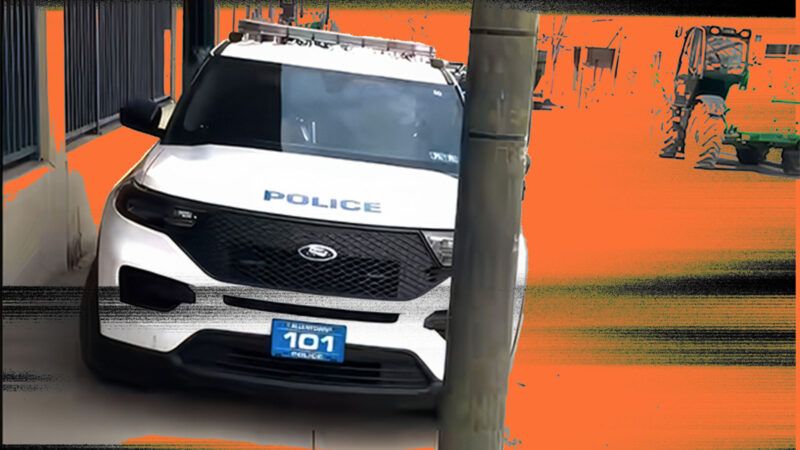Police Officer Threatens To Run Over Protester for Filming on the Sidewalk
The city of Allentown has spent more than $2 million settling excessive force claims, and yet the police still crack down on civilians exercising their constitutional rights.

As longtime Reason readers are aware, police officers often don't like to be filmed by the public.
Recently, an officer in Pennsylvania got so fed up with being recorded that he drove his car on the sidewalk and threatened to run over a civilian, for the offense of filming on public property.
Courts have broadly held that civilians may legally record the police, so long as they don't physically interfere with officers doing their job. Even so, some officers chafe at the extra scrutiny: In recent years, officers have played copyrighted music in an attempt to keep the videos from being shared online. While underhanded, this is at least a relative improvement over the alternative, when officers would simply grab the phones from people's hands and arrest or pepper-spray them.
Between 2015 and 2021, the city of Allentown, Pennsylvania, paid out more than $2 million to settle 14 cases of excessive force by the police. Some of those cases involved police hostility to civilians doing nothing more than filming.
In October 2014, Allentown police arrested a college student, punching and tasing him in the process, for not providing his name even after they had taken his ID; they then arrested Eli Heckman, who was recording the arrest nearby, and smashed his phone. The city later settled with each of them, paying the student $95,000 and paying Heckman $45,000.
Unfortunately, it seems Allentown's police haven't learned their lesson.
Phil Rishel started recording Allentown officers with his cell phone as a form of protest in 2023, often while standing on the sidewalk outside the precinct. Things came to a head one day in March 2024, as Rishel filmed near the parking garage. In a video Rishel shot that day, an officer—later identified as Dean Flyte—can be seen walking out to the sidewalk and, without speaking, ostentatiously orienting himself toward a posted sign that reads, "Private Property, No Trespassing," before going back into the parking garage.
"That's a nice sign," Rishel snarks. "Too bad it doesn't apply to the public sidewalk."
This apparently did not sit well: Minutes later, Flyte gets into his police cruiser and leaves the parking garage near where Rishel is filming—even cutting a turn too sharply and sideswiping the building in the process. In the video, Rishel howls with laughter, but Flyte then drives onto the sidewalk, bearing down on Rishel while blaring his siren. Rishel backs up but keeps filming; even when Flyte reaches a pole and can't keep going, he goes to the trouble of backing up and driving around the obstruction and back onto the sidewalk so he can continue his pursuit.
Flyte later exited the vehicle and went inside the precinct, returning with a supervisor, Sergeant Christopher Stephenson. Flyte threatened to arrest Rishel for loitering if he kept recording, and Stephenson agreed, saying Rishel's "antics are well known."
When Rishel returned the following day, Stephenson confronted him again. "I warned you yesterday not to come back and do this shit," he says on video. Rishel says he's protesting on a public sidewalk, to which Stephenson replies, "You're not protesting, you're being a nuisance….One person isn't a protest." He later adds, "You're not saying anything, you're not doing anything; filming is not a First Amendment right" and "is not observed by Pennsylvania law" as a protected form of speech.
This is nonsense: In 2017, the 3rd Circuit Court of Appeals held in Fields v. City of Philadelphia that "under the First Amendment's right of access to
information the public has the commensurate right to record—photograph, film, or audio record—police officers conducting official police activity in public areas." That case involved the Philadelphia Police Department, whose "official policies," the court noted, "recognized that '[p]rivate individuals have a First Amendment right to observe and record police officers engaged in the public discharge of their duties.'"
Besides, no police officer has the authority to decide what does and does not constitute a protest—if he did, it would render the First Amendment meaningless, as any officer could just say a protest didn't count.
Still, Stephenson cited Rishel for disorderly conduct and loitering—though it's hard to imagine anything more disorderly than driving onto a sidewalk and blaring a siren while threatening to run somebody down in your car.
This week, Rishel filed a lawsuit against the city of Allentown, as well as Flyte and Stephenson in their individual capacities. (Flyte retired from the department in December 2024.) Rishel seeks declarative injunctions stating that civilians may record police from public property without harassment, as well as damages against all three defendants. He is being represented by the Foundation for Individual Rights and Expression (FIRE). "Citizens trying to hold police officers accountable should not be punished," FIRE attorney Zach Silver said in a statement. "Public officials, including police officers, must uphold the law and respect citizens' right to record police and to use harsh language, not bully them into silence."
Sadly, it seems the Allentown Police Department is sorely in need of reform. Earlier this year, a local TV station reported on allegations of corruption within the department, including theft by vice officers.


Show Comments (30)